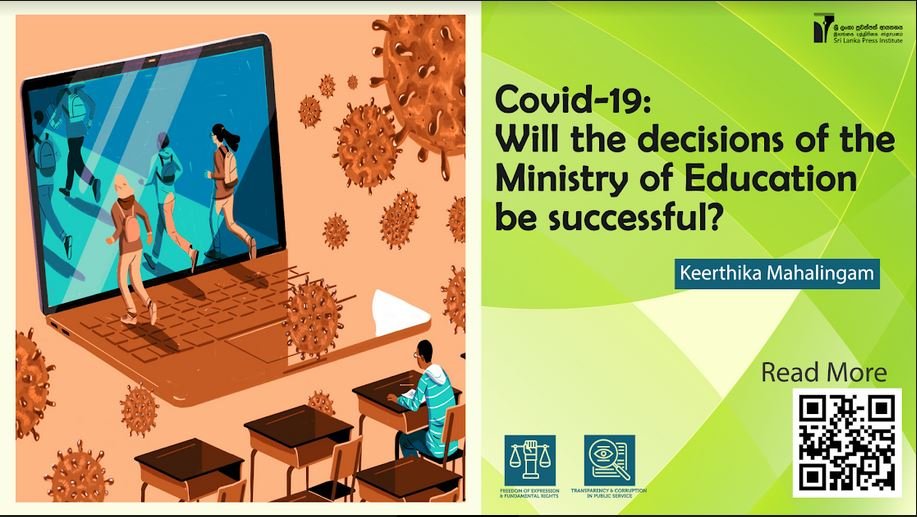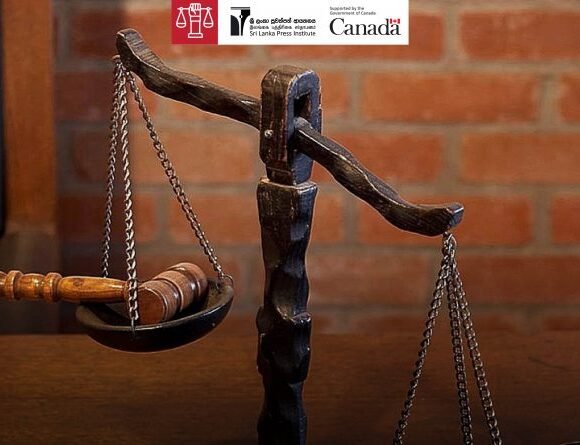
Covid-19: Will the decisions of the Ministry of Education be successful?
Keerthika Mahalingam
The spread of the Covid-19 virus has made the education sector one of the most affected in the world. The inability of any student to engage from pre-school to higher education has posed a great threat. Countries across the world are implementing various troubleshooting mechanisms to protect society from this sudden disaster. Following the virus spreading in Sri Lanka, the Ministry of Education took various timely decisions to streamline academic activities. But the question is, how successful these measures are when using modern technology in a broad aspect. Education experts and parents alike complain as it has not been successful.
“When I was preparing for the scholarship exam, schools were closed due to Corona. My teachers wanted us to interact with the lessons via WhatsApp, but I’m not interested in learning just by answering questions. My sister is in Grade 3, and her teachers also want her to proceed in the same way. So there is always a competition between the two of us as to who gets my mother’s phone first. But since I am sitting for the scholarship examination this time, my mother gives me priority”, said Warsha, a student from Wattala in Gampaha who sat for the scholarship examination this year.
There is no doubt that you are aware of the problems of many students in this way. The Ministry of Education took various decisions regarding the continuation of the academic activities of students as schools closed due to the Covid-19 spread. However, those decisions failed to provide a long-term practical solution to distant education problems.
The methodology for conducting studies via the Internet
“It is an important decision to break away from the traditional education system and move to an online education system. With the spread of Corona, the use of education on the Internet is a new method introduced in Sri Lanka, but this method is not alien to other countries. Online or distant education is a successful teaching method that has been in operation overseas before Covid. But in Sri Lanka, this system was seen only in university-centred education which is known as the “Learning Management System” which has been used as an auxiliary method of searching for information. But this approach is still new in school-level education”, stated the Head of the Department of Media Studies, University of Jaffna, Dr Raghuram.
“The education system in Sri Lanka is based on face-to-face interaction. Therefore, due to the hasty decisions taken by the Ministry of Education, confusion has arisen between the student community and teachers”, Dr Raghuram said.
Following are the various challenges which can be seen in the online education system in regard to Sri Lanka context:
- Inability to purchase necessary technological equipment required for the use due to family economic conditions.
- Lack of instant, convenient or free internet access.
- Poor connections for internet access.
- Lack of a uniformed physical environment conducive to education for all.
- Failure to provide proper training to students and teachers on online teaching methods.
- Lack of understanding of technical issues and the use of technical equipment.
- Difficulty in retaining students’ attention.
It is common for various problems and challenges to arise when entering a new teaching process through the Internet. It is also challenging to introduce new methods without strengthening the necessary infrastructure. Dr Raghuram said this challenging teaching process can only be successful if the government and its stakeholders implement proper methods.
The Government has facilitated an e-Learning website named “e-Learning Thaksalawa” (https://www.e-thaksalawa.moe.gov.lk/ ). Courses relevant to all grades are available in all three languages. As per the regulations of the Telecommunications Regulatory Commission of Sri Lanka (TRCSL), users are not charged for using this website. But it is time to re-examine the functionality of this site and the potential problems with its usage.
(http://www.colombopage.com/archive_20A/Mar25_1585117046CH.php )
The scholarship examination and the GCE (Advanced Level) examination which was scheduled to be held in August were postponed without a due date due to the Corona first wave. Some of the students who appeared for the exam showed symptoms of coronavirus infection but in the midst of various challenges, the scholarship exam and the A / L exam were held. However, the practical examinations of the Advanced Level Examination and the resumption of the GCE (Ordinary Level) Examination were postponed without a due date. The syllabus is completed in a process which pre-determines the dates for the GCE (Ordinary Level) Examination and the GCE (Advanced Level) Examination will receive the relevant examination time tables in advance, said Dr Raghuram.
Further, the postponement of exam dates has an inevitable psychological impact on students as their mentality is built towards exams. But Dr Raghuram says it is unfair for students to take exams without completing the syllabus properly or after completing parts of the lessons. During this time many problems arose such as the sudden prevalence of Corona and the encounter of infected clusters. In foreign countries, they postponed the examinations/academic year decisively for a long period of time. But we need to rethink how effective it is to postpone exams without holding them on time. This is a big challenge for students who are engaged in exam-oriented academic activities. However, a school-centric examination programme should be implemented with a neutral focus on external environmental factors that contribute to the inability to conduct physical examinations.
Examinations were also postponed during the civil war in the North and East. It is a man-made problem. Corona is a natural disaster. But the effect of both conditions is the same. When looking into the big picture, conducting examinations without fully covering the syllabus does not give students the correct subject-based knowledge, emphasized Dr Raghuram.
Reopening of schools
“The schools which were closed due to the impact of the second wave of Coronavirus outbreaks are all set to re-open following proper hygiene practices”, the Ministry of Education announced. But the Ceylon Teachers Union continued to oppose the reopening of schools. However, schools were re-opened on November 23rd for students from Grade 6 to Grade 13 in all provinces except the Western Province. However, there have been reports of schools being closed again in many districts. The World Health Organization (WHO) has introduced a set of health guidelines to be followed if schools are to be started during the pandemic situation, but it is doubtful to what extent those guidelines can be put into practice.
“How practical is it to re-open schools and keep schools running under normal circumstances? Is our government ready for that? Is the health sector ready? – some of the major forthcoming issues in regard to the education crisis at the moment. In other countries, the use of modern medical and health care facilities routinely monitor the presence of infected people. But due to the existing problems in our culture and infrastructure, the existing gap in the health sector cannot be filled in the same way here. Various decisions which were taken by the government due to the lack of proper transportation system, inadequate lavatory facilities and problems in locating students in a confined classroom with a gap between students and teaching with fewer infrastructure facilities are common. The haphazard decision to re-open and close schools again is not a healthy step. It adversely affects the physical and mental health of the students. It also creates an unstable tendency for school children to pursue their education”, Dr Raghuram emphasized.
Conducting teaching activities through television broadcasts
Due to the closure of schools with the spread of the first wave of Corona on April 20th, Sri Lanka Rupavahini Corporation (SLRC) launched ‘Guru Gedara’ a television programme to teach and educate students at home. Television education has existed in Sri Lanka before, but only a few subjects were taught.
“It is questionable whether teaching on television is entirely effective for students because our education system is based on an interactive teaching methodology. It is difficult to get a quick response to lesson questions through one-way teaching through television., and although such methods are in operation around the world, they are still lagging behind”, stated Dr Raghuram.
Since school education is seen as basic education, the decisions made call into question the higher education and future of the students. It is a futile practice to pass formal examinations which are a traditional method and then go for higher education. However, the practice of exam-oriented education has not focused on assessing students’ knowledge. As Dr Raghuram says, this has created a situation to face new challenges. He said that a solution to the current educational crisis could be found by implementing a practical programme that would provide continuous education (Educational Continuity) without any hindrance. Making temporary and unstable decisions is ineffective. There is no point in making drastic decisions with limited resources. Sri Lanka can move away from the education crisis that occurred due to Covid-19 only if decisions are made and implemented with a deep focus on the mental state of students, socio-physical factors, lack of resources, and development of public facilities.








